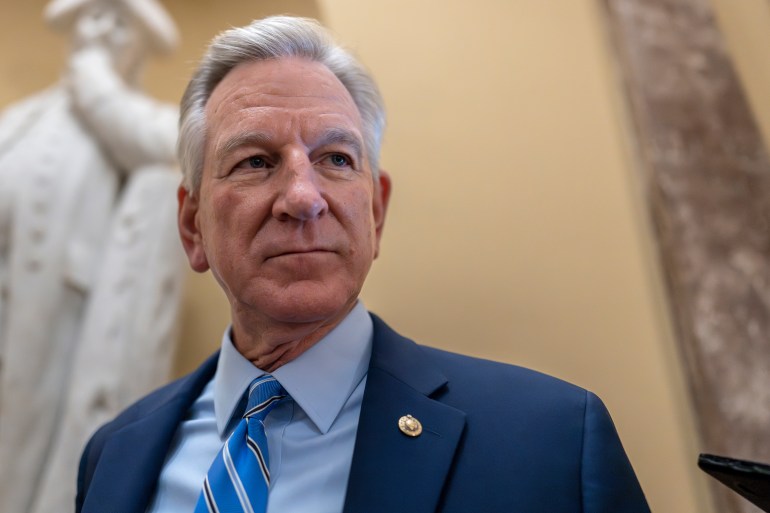Senator stalls US military promotions in anti-abortion standoff
Senator Tommy Tuberville has blockaded nearly 265 military confirmations to protest the Pentagon’s abortion stance.

One senator’s anti-abortion protest has resulted in the United States Marine Corps — one of the country’s most elite military units — being without a confirmed leader for the first time in 164 years.
Senator Tommy Tuberville of Alabama has refused to confirm promotions to top military posts until the Pentagon agrees to end its policy of offering leave and travel funds for reproductive healthcare, including abortion.
Keep reading
list of 3 itemsMinnesota abortion clinics embrace support in year since Roe fell
An ex-anti-abortion evangelist on life as a pro-choice ‘traitor’
Tuberville’s strike has left an estimated 265 military positions in limbo. On Monday, General David Berger, the commandant of the Marine Corps, retired in an official farewell ceremony, leaving his post without a congressionally approved replacement.
The last time the Marines’ leadership failed to have an official successor was in 1859, when the commandant at the time died unexpectedly.
General Eric Smith is set to take Berger’s place in the interim as acting commandant, until promotions resume in the Senate.
“We need the Senate to do their job so that we can have a sitting commandant,” Berger said at his retirement ceremony.

A backlog of confirmations
But the dilemma of Berger’s high-profile departure is far from an anomaly. In the coming months, nearly half of the Joint Chiefs of Staff — the highest leaders in the Department of Defense — are expected to retire, leaving vacancies that threaten to be filled without Congress’s consent.
Tuberville’s blockade of incoming military leaders has sparked an outpouring of criticism, even from his colleagues within the Republican Party, some of whom see his actions as risking military preparedness.
“I don’t support putting a hold on military nominations,” Senate Republican leader Mitch McConnell said in May, when asked about Tuberville’s stance.
Secretary of Defense Lloyd Austin has also spoken out against Tuberville’s actions. During Berger’s retirement ceremony on Monday, Austin remarked that such a circumstance had not arisen in well over a century.
“Smooth and timely transitions of confirmed leadership are central to the defence of the United States and to the full strength of the most powerful fighting force in history,” Austin told attendees.
“Stable and orderly leadership transitions are also vital to maintaining our unmatched network of allies and partners. And they’re crucial for our military readiness.”

In a May letter to Democratic Senator Elizabeth Warren, Austin called Tuberville’s hold on the confirmations “unprecedented in its scale and scope”.
“This indefinite hold harms America’s national security and hinders the Pentagon’s normal operations,” he wrote. “The longer that this hold persists, the greater the risk the US military runs in every theater, every domain and every Service.”
Pentagon spokesperson Sabrina Singh estimated that as many as 650 military positions could be left unconfirmed by year’s end, if Tuberville refuses to end his blockade.
She also told The Associated Press that the hold-up could leave military officers serving in multiple positions at once, in order to address the vacancies.

Protesting Pentagon policy
For his part, Tuberville has denied that his blockade is preventing military business from passing the Senate.
“I am not stopping anyone from getting confirmed, and I am not stopping anyone from voting,” Tuberville wrote in an opinion column in the Washington Post.
Military confirmations are often passed through a procedure called “unanimous consent”, which eliminates the need for a formal vote and allows routine Senate business to be dealt with quickly.
But if a single senator objects, “unanimous consent” cannot be used to consider business before the chamber.
As Tuberville pointed out in his Washington Post column, the Senate could instead vote on each appointment one by one — but critics say that process would be slow and cumbersome.
“Democrats could simply put these nominations up for a vote, but they clearly don’t want to,” Tuberville wrote.
“Instead they wasted hours of Senate floor time trying to harangue me into letting the nominations pass through unanimous consent. This tactic hasn’t worked, and it won’t work.”
Tuberville’s protest against “unanimous consent” stems from his objection to a recent Pentagon policy for offering reproductive healthcare resources.

In the wake of the 2022 Supreme Court decision overturning Roe v Wade — the case that had previously protected abortion as a constitutional right — the Department of Defense announced it would offer allowances for military service members to travel for reproductive healthcare.
While the department’s policy memo, released in February, does not explicitly name abortion, observers understood it as an attempt to circumvent abortion restrictions that went into place after the Supreme Court’s decision.
Approximately 14 states have near-total bans on abortion, including Tuberville’s home state of Alabama. Other states have gestational limits that bar abortion after a certain number of weeks of pregnancy, sometimes before patients even realise they are pregnant.
“Our Service members and their families do not control where they are stationed,” the Pentagon said in the policy memo.
“The efforts taken by the Department today will not only ensure that Service members and their families are afforded time and flexibility to make private health care decisions, but will also ensure Service members are able to access non-covered reproductive health care regardless of where they are stationed.”
But Tuberville has argued that the policy memo violates the law — namely, the Hyde Amendment, which largely limits federal funds from financing abortion.
He has called on the Department of Defense to either suspend the policy or put it before a congressional vote.
“If Democrats can’t pass legislation to authorize the abortion policy, then it shouldn’t be the policy,” he wrote in his column.

A lengthy delay
Other politicians have held up routine votes before — including Tuberville’s Democratic colleague Tammy Duckworth, herself a military veteran.
But, as she pointed out on the Senate floor in May, her blockade lasted only 14 days. Tuberville’s has endured since February.
“My colleague from Alabama is harming our military readiness and our service members not out of concern about the promotion process or the ethical or professional qualifications of any of the nominees,” she said.
“He’s doing it to score cheap political points, to fundraise with his base and to try and force a policy that he personally disagrees with to change.”
On Saturday, Duckworth reiterated her plea to Tuberville over social media: “Enough. I implore the senior Senator from Alabama to end his crusade.”
In the coming months, the staff chiefs of the Air Force, Army and Navy are all expected to step down. In addition, Army General Mark Milley, who serves as chairman of the Joint Chiefs of Staff, is slated to retire in September.
Replacement candidates could face the same hold-up over the next few weeks, should Tuberville continue his blockade. Milley’s replacement, General CQ Brown, is slated to face a hearing before the Senate Armed Services Committee on Tuesday.